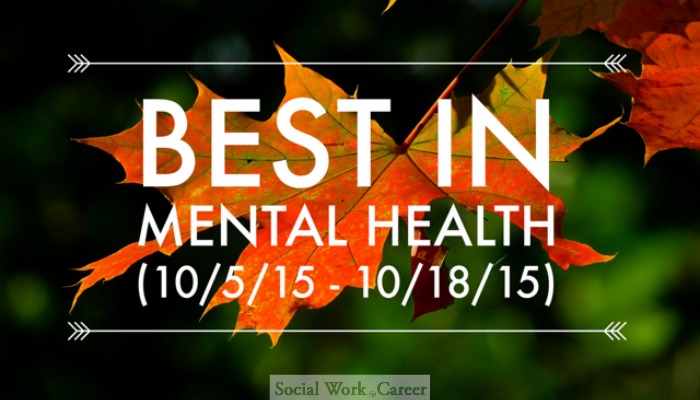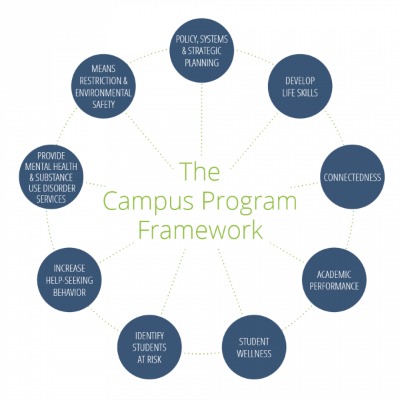Below is a round-up of some of the latest news in mental health (and more)!
This week’s wrap-up has 5 main themes:
- Healthcare
- Advocacy/Cultural Sensitivity
- Therapy/Emotions
- Technology and Mental Health
- Career/Non-Profit
Healthcare
- NATO Develops a Multinational Telemedicine System Designed For Emergency Response – When it comes to disaster relief, time is of the essence; this is why NATO is testing a telemedicine system, that they hope to turn into a multinational emergency response tool.
- Stop the Madness – Cohn discusses a miraculous new treatment for schizophrenia that could transform the way we treat mental illness [H/T to Mozart].
- Webcast – patient engagement from the patient’s point of view – e-patient Dave – this speaks for itself!
- What a successful university mental health program looks like – to create mental health (not just prevent suicide), students would benefit from learning to build life skills like time management, basic health and nutrition, as well as when to reach out for help. [H/T to Mozart]
Advocacy/Cultural Sensitivity
- 3 Misconceptions About Gentrification – Thompkins-Jones shares Dr. Sutton’s talk about gentrification; contrary to what some people believe, it is a manifestation of inequality and is further confounded by America’s legacy of racism.
- Bastards – Therapydoc reviews the life story of Mary Anna King; the book conveys what it feels like to lose siblings, either as the one who is taken away from the others, chosen by an adoptive family, or as the one left behind.
- CIA Torture Techniques Harm Interrogators As Well – torture used as an interrogation device can have severe, long-lasting effects on physical and mental health on both the detainees and the CIA personnel involved in the interrogations of suspected terrorists.
- High School Student Invents Wheelchair Stroller for Disabled Parents – Thompson shares story of inspiring and useful invention.
- It feels like very cold ice-cream on your teeth! – Henry shares some of the characteristics of children with Sensory Processing Disorder (SPD) in Early Years settings.
- LGBT Youth in the Juvenile Justice System – West shares Casey Foundation’s guide on juvenile detention reform; guide also provides an overview of terminology related to sexual orientations, gender identity, and gender expression.
- The Power Differential and Why It Matters So Much in Therapy – Barstow relays the necessity to understand and own the greater role power that helping professionals have relative to people they help to retain effectiveness and avoid misuse of power.
- Remove Obstacles to the Work of Women’s Rights Defenders – Muižnieks relays how most defenders of women’s rights are women with a high risk of experiencing gender-based violence, harassment and verbal abuse and calls for more support/protection.
- SAMHSA releases: “Ending Conversion Therapy: Supporting and Affirming LGBTQ Youth” – a helpful report for social workers, families, and the broader community; it provides examples of appropriate resources and therapeutic approaches.
- Siding with the bully is easier – Beckwith explains how the default is to blame the victim and side with the bully; however, we would all benefit from changing these patterns and challenging power.
Therapy/Emotions
- Cognitive Conceptualization – in short clip from Psychotherapy Networker, Dr. Riggenbach shows you how to use Cognitive Conceptualization to help your clients get to the root of their problems by tapping into their past.
- Deciding for My Client: When Social Workers Serve as Proxies – Barsky raises various considerations to take into account before acting as a proxy for a client such as potential conflict of interest, agency policy and liability insurance.
- Depression and #ReasonsToStayAlive [podcast] – Malcolm interviews Matt Haig who wrote an inspiring memoir of how he emerged from severe depression and anxiety, and learned to live again.
- Expressing Grief Through Poetry – Ferrick shares some poems she has written about grief and loss, illustrating how loss pulls us in unexpected directions.
- Good Shame And Bad Shame – via the Wizard of Oz, Kerr discusses abuse-related shame symbolically in which Dorothy overcomes shame; all the characters represent parts of the self that split off in response to the trauma of abuse.
- How Empathy, Kindness and Compassion Can Build Belongingness and Reduce Bullying – Hinduja provides examples of kids working to reduce bullying and cyberbullying by promoting compassion and self-reflection.
- How to Develop a Safe Place For Mental Illness Recovery – Oberg describes the process of creating a safe space for EMDR therapy from the perspective of a client.
- Integration – social work is inherently different from health care; to create successful integration, Ermintrude suggests clarifying what this is and establishing best outcomes by involving patients/clients in the integration design.
- It’s Never REALLY About the Couch – Labuzan-Lopez relays the importance of examining the process vs. the content in conflicts; how you argue reveals the underlying issues that contribute to disagreements.
- Perinatal Loss & Grief: Coping, Hoping & Healing Together – perinatal loss often feels like a “silent” loss and often involves a sense of biological failure and a loss of self; to heal, Dr. Hibbert and Martin suggest grief work, turning toward one another, and relying upon family, friends, and other supports.
- The Point – Crawford elaborates on the careful truth-telling therapists engage with clients, in order to peel away resistance/cherished illusions that may be entrapping them. This must be done carefully because clients’ defenses/false beliefs exist for a reason.
- Postnatal depression – Jane Iles concludes that the study’s findings strongly suggest that women with a history of mental health difficulties prior to conception are at an increased risk for depression during pregnancy or the first postnatal year.
- The Risks of Joy – Dr Burgo illustrates with two case examples the joy-shame connection whereby the potential experience of joy threatens the emergence of shame and thus shuts down.
- Where’s Waldo? A creative tool to introduce CBT skills – In Ballantyne’s work with clients, she often asks them to practice completing a thought log while engaged in a “Where’s Waldo?” activity; this gives them an outlet to practice emotional distress tolerance and implement CBT skills.
Technology and Mental Health
- #APM2015 Using Documentaries and Twitter to Meet Macro/Policy Objectives in Social Work Education – Drs. Young and Hitchcock share their presentation on how twitter assignments can be incorporated into social work policy and macro courses.
- BCSSW Convenes First-of-its-kind Neuroscience and Social Work Symposium – symposium synthesized humanitarian mission of social work with cutting-edge advances from cognitive neuroscience in understanding the human brain.
- Being in a Relationship with Someone with PTSD – A Video Game Analogy – Hanson helps you understand what you will face when getting into a relationship with someone who is struggling to heal and integrate a trauma history.
- Casework, Social Justice, and the Information Age (part 1 of 2) [podcast] – Dr. Eubanks discusses an attempt to use technology to change eligibility processes for financial assistance as an example of why this technology is an important social justice issue.
- Wanted, Social Workers on the Hill (Live from CSWE Annual Program Meeting) #2015APM – Holmes calls for social workers to run for office and/or support their colleagues that do. Follow-up meeting has been postponed to Sat, Oct 24.
- Find your social media voice. Patients are listening – Patients are already on social media looking for accurate information; this is why Dr Ting recommends you take the time to provide important patient education amidst a sea of misinformation.
- No proof that 85% of mental health apps accredited by the NHS actually work – As of Oct 16, the NHS Choices Health Apps Library will officially cease to exist; however, apps with approval from other well-established regulatory bodies such as the FDA can act as an intermediary quality control.
- The problem of being ‘professional’ – socialworknz calls for making registration for social work mandatory in New Zealand; social work’s status as a profession lacks ‘protection of title.’
- Research, innovation and social work education – Worsley stresses the importance of research and calls for us all to play a role in incorporating research in our work such as managers providing their staff with opportunities to engage with research and academics sharing research.
- Why Social Media Matters – Higdon shares how social media enables us to inspire, influence our communities and promote social justice by educating, stimulating dialogue and removing stigma.
NonProfit/Career
- Common Mistakes Almost Every New Private Practitioner Makes [podcast] – Varghese interviews Dr. Lowenthal about the steps she took to build her practice; if she were starting over, she would repeat these steps that she had taken.
- Digital Ethics Live Learning Groups – Digital Confidentiality According to Professional Ethics and HIPAA: A Heart-Centered Approach; 3 main steps for HIPAA Security Rule compliance. First CE session is free.
- Free Social Work Exam Study Guide – SWTP is offering a free guide that includes seven practice questions, rationales, study links, study tips, and anxiety reduction help.
- How can I promote my business without appearing desperate for clients? [podcast] – Juliet and Clinton provide guidance on how to market your business at the beginning vs later when it is more established.
- I Want Training–Where Do I Start? – Staggs describes four levels of training from merely reading a book, obtaining some formal training (via one day classes/conferences) to integration into cases and how best to progress.
- Marketing Your Perinatal & Postpartum Psychotherapy Practice – A Case Study – Suttle provides practice building suggestions to Wilson’s marketing dilemma.
- Personal Branding For Job-Seekers [Idealist free webinar] – Tuesday, Oct 20th at 1pm EST – you will learn how to narrow the focus of your job search so you can succinctly share who you are, and articulate who you are, what you want, and how people can help you.
- Sliding Fee Scales and Brain Evolution [podcast] – Sanok interviews Paul Fugelsang about OpenPath, a collective of therapists who provide in-office treatment for $30 to $50 a session, as an alternative to offering sliding scale fees.
- Trainer’s Notebook: Fishbowl Facilitation Technique – Kanter shares a creative method to engage a group of people in reflective conversations versus didactic content.
Like this post? Please share it!






I love these best in mental health round-ups. Here is an article I wrote for World Mental Health Day about behavioral health integration and primary care. It’s another great topic to be talking about. Thanks for putting all of these articles together. http://thehippieinmeblog.com/2015/10/10/mental-health-and-primary-care-the-integration-imperative/
Thanks so much for your kind feedback, Robin as well as for sharing for your article about the integration of mental health and primary care.